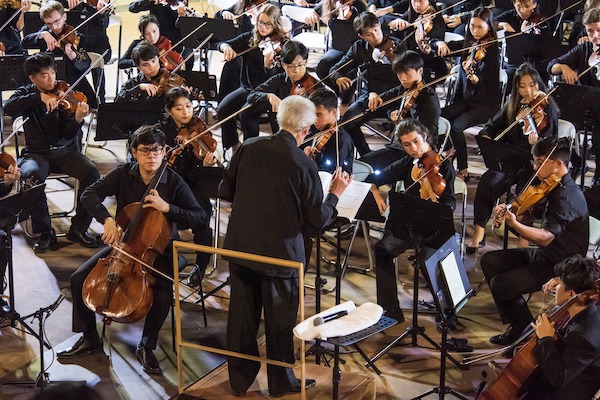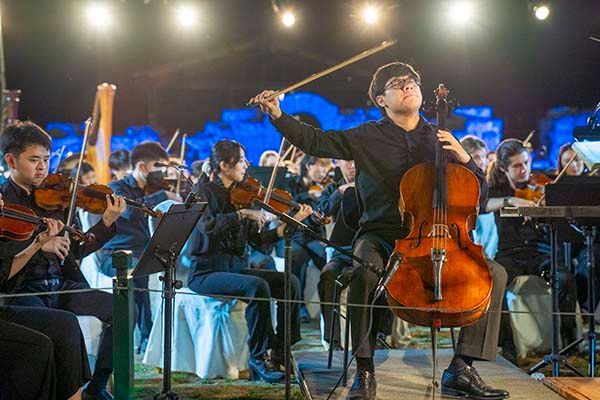Classical Music Preview: Boston Philharmonic Youth Orchestra Season Finale
By Jonathan Blumhofer
“There’s nothing better to do on Friday night than hear this orchestra play. What else would people do that would be better? Of course, people get very excited about the sports teams — and most of them lose. But this orchestra never loses. It wins every game!”
“It’s a good moment,” Benjamin Zander says. The conductor might have been referring to the Boston Philharmonic Orchestra’s season finale of the night before.
But he wasn’t.

Benjamin Zander conducting the Boston Philharmonic Youth Orchestra and cellist Zlatomir Fung performing Robert Schumann’s Cello Concerto. Photo: Christos
Rather, when we chatted over Zoom on Saturday, Zander was already focusing on the next thing: the closing performance of ’23-’24 for his other ensemble, the Boston Philharmonic Youth Orchestra. They wrap their local season at Symphony Hall on Friday with a concert pairing Robert Schumann’s Cello Concerto and Gustav Mahler’s Symphony No. 5. Then, in June, the group embarks on a five-city European tour.
“The concert on Saturday is the end of the season and it’s exactly the program we’re going to take on tour,” Zander notes. “What’s interesting about it from my point of view is that one of the concerts on tour is already sold out, the [Elbphilharmonie] in Hamburg.… and that’s a very remarkable thing, because why would a traveling youth orchestra fill up a hall of 2,000 seats weeks in advance? That’s amazing.
“It’s a combination that they have invited us to give the concert,” he continued, “usually with youth orchestra tours, we self-promote–– but in this case they gave us the opportunity to give a concert in the Elbphilharmonie. And that was the basis of the tour.… we built the whole program around that.”
That program, which will be introduced on Friday, features the return of a dear friend of both Zander’s and the BPYO’s, cellist Zlatomir Fung. The youngest-ever winner of the Tchaikovsky International Competition, Fung was recently appointed to the faculty of the Juilliard School (“at the age of 25 — that is extraordinary!” Zander marveled, with typical enthusiasm).
He last appeared with the ensemble in 2022, playing Edward Elgar’s Cello Concerto (both in Boston and, later, on the BPYO’s tour to Greece). Zander’s ecstatic to have him back.
“I think he’s just extraordinary,” the maestro says. “I remember … with Yo-Yo [Ma] when he played the Dvorak [Concerto] for the first time” — with Civic Symphony, which Zander conducted — “the same kind of excitement. It’s musical, it’s instrumental, but it’s also human. He just radiates such joy and connection. It’s amazing.”
“And his Schumann,” he went on, “is absolutely beautiful. I mean, it’s as beautiful as I’ve ever heard it.”

Cellist Zlatomir Fung performing Robert Schumann’s Cello Concerto with the Boston Philharmonic Youth Orchestra. Photo: Christos
One of Schumann’s last works, the A-minor Cello Concerto lingered in obscurity for decades. Its unusual structure and inward nature apparently confused early critics and a general hostility toward the composer’s later works (which were written as his mental condition deteriorated; Schumann died institutionalized in an asylum aged just 46 in 1856) meant that the score has only seriously entered the repertoire in the last 50 or 60 years.
Prominently championed by Jacqueline du Pré and Ma, the Concerto is, in Zander’s opinion, in excellent hands with Fung: “In that one rehearsal we had” — in late March; there will be a final tune-up with soloist and orchestra on Thursday — “it was absolutely electrifying, his rapport with the orchestra, his attention to detail. So I think Friday will be an extraordinary event.”
The pairing with Mahler’s Fifth Symphony should be rewarding, too. “I think Schumann and Mahler is just as good [as the Philharmonic’s Mozart and Bruckner last week] because they speak to each other in such amazing and important ways,” the conductor noted. “It’s not original, of course — it’s often done. But it is a felicitous combination.”
That doesn’t make the program easy. Quite the contrary.
“I think [the Fifth is] the hardest of the Mahler symphonies. The Second” — which BPYO presented last season — “is a breeze by comparison. This one is … a fiercely difficult piece to bring off and the third movement is, without question, the hardest he ever wrote.… It’s hands-on at every moment, and you can’t let go for a single second. But [the orchestra] loves it, they just love this piece.”
Technical complexities aside, Mahler’s Fifth is as expressively direct and immediate a symphony as they come. Zander, who’s championed the composer’s music for decades, has recorded much of it with London’s Philharmonia Orchestra, the BPO, and the BPYO. He’s also crafted a series of informative introductory talks (including one on the Fifth), which are available on his website.
After Friday’s concert, rehearsals begin for the ensemble’s European tour, which will visit Basel, Prague, Hamburg, Vienna, and Berlin.
“The idea of the Youth Orchestra going to Europe and playing in the greatest concert halls and playing for very serious audiences is something to be proud of — there’s no question about it,” Zander said.
“We’re going for two weeks, we’re playing five concerts in four different countries, in the top concert halls in Europe” — including Prague’s Rudolfinium, Vienna’s Musikverein, and the Berlin Philharmonie — “and everybody’s going and they’re going for free. It’s absolutely staggering! Of course, it costs a fortune … but we’re raising money ‘round the clock.”
Why bother with such an undertaking? Well, the conductor has strong thoughts on that very question.
“The world should hear the BPYO,” he declared. “Not just because it’s a wonderful orchestra — because there are many of those — but because it’s a group of accomplished human beings and it tells a story from the ways it behaves.… it’s not just an orchestra, it represents a way of approaching life and it affects every single person who hears it. It’s something to be both really proud of and inspired by.
“And, although the audiences we meet will only be brief encounters, I think people get a sense of purpose, seriousness, dedication, and love coming from the stage, which they’re not used to. It’s a revelation, really, for people. And that’s the message and that’s why I keep doing it and why we get people to keep funding it, because they realize it’s something very special.”

Benjamin Zander and the Boston Philharmonic Youth Orchestra. Photo: Hilary Scott
And the BPYO is part of a bigger phenomenon. “Look,” Zander noted, “Boston has a remarkable youth orchestra culture. [New England] Conservatory has a great program. The Boston Youth Symphony Orchestra is great program. And, with our program, together, that makes for the richest mix of [orchestral] programs of young musicians anywhere in the country.”
He hopes local audiences recognize and take advantage of this special situation. Late in our conversation, he related that the parents of one of the orchestra’s players will be flying in from Seoul to hear the BPYO for the first time.
“So, if they can come from Korea,” he said with a laugh, “they can also come from Mattapan and Billerica! There’s no excuse for empty seats in Symphony Hall. And this is something I promise: if the audience doesn’t have a fabulous time at Symphony Hall, I’ll personally refund their money!”
Either way, Friday’s concert is a time for musical celebration.
“This year has been, I think, the best musical year I’ve had with these two orchestras,” the loquacious Zander mentioned in closing. “It’s been consistent throughout the year. It’s been a really fabulous season and I’m really happy about it. And this is the culmination for the BPYO before it goes on tour.
“There’s nothing better to do on Friday night than hear this orchestra play. What else would people do that would be better? Of course, people get very excited about the sports teams — and most of them lose. But this orchestra never loses. It wins every game! And with the screaming, shouting, and carrying on at the end — why wouldn’t you want to be a part of that?”
Jonathan Blumhofer is a composer and violist who has been active in the greater Boston area since 2004. His music has received numerous awards and been performed by various ensembles, including the American Composers Orchestra, Kiev Philharmonic, Camerata Chicago, Xanthos Ensemble, and Juventas New Music Group. Since receiving his doctorate from Boston University in 2010, Jon has taught at Clark University, Worcester Polytechnic Institute, and online for the University of Phoenix, in addition to writing music criticism for the Worcester Telegram & Gazette.
Tagged: Benjamin-Zander, Boston Philharmonic Orchestra, Boston Philharmonic Youth Orchestra

